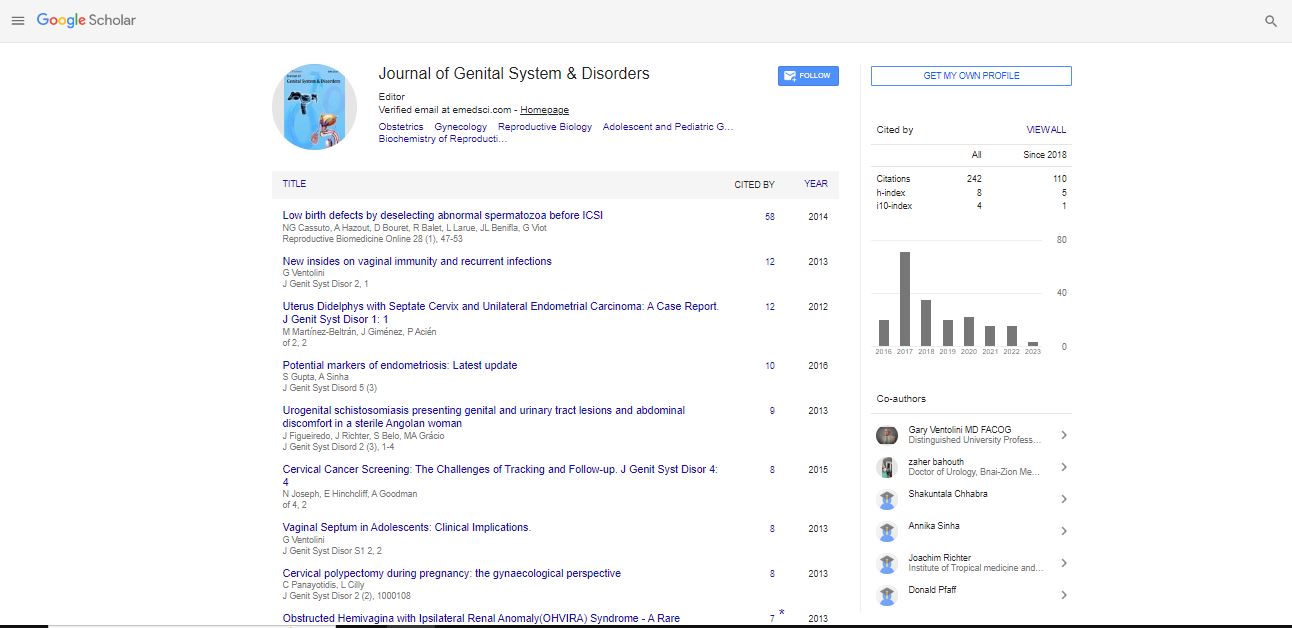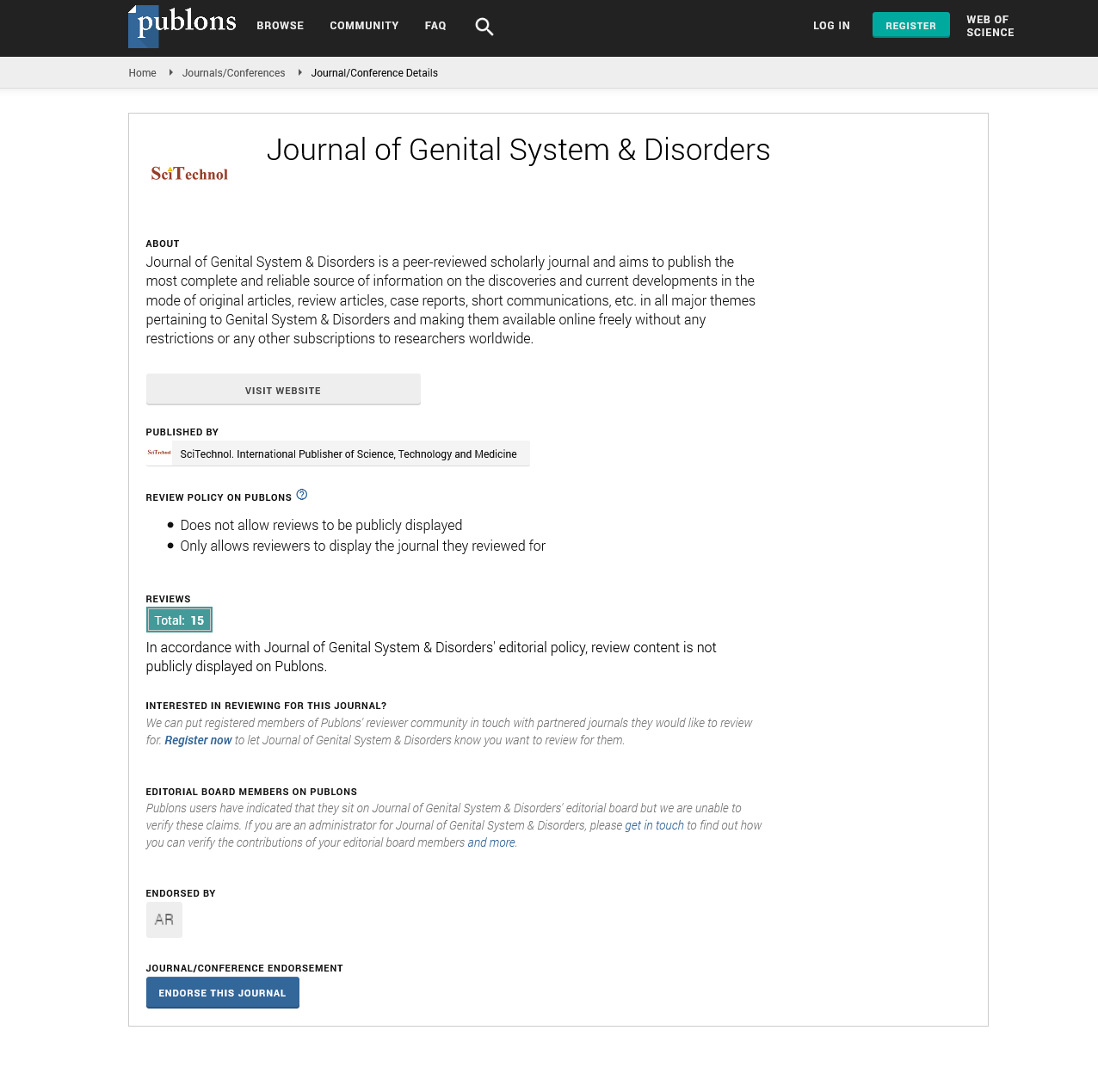Perspective, Vol: 14 Issue: 1
Frontier of Reproductive Medicine: Advanced Technologies and the Future of Fertility Preservation and Assisted Reproduction
Sarah Wang*
Department of Reproductive Biology, University of Michigan, Michigan, United States
*Corresponding Author: Sarah Wang
Department of Reproductive Biology, University of Michigan, Michigan, United States;
E-mail: Wangsarah.uom.edu
Received date: 02 March, 2024, Manuscript No. JGSD-24-128701;
Editor assigned date: 04 March, 2024, QC No. JGSD-24-128701 (PQ);
Reviewed date: 18 March, 2024, QC No. JGSD-24-128701;
Revised date: 03 March, 2025, Manuscript No. JGSD-24-128701 (R);
Published date: 10 March, 2025, DOI: 10.4172/2325-9728.1000285
Citation: Wang S (2025) Frontier of Reproductive Medicine: Advanced Technologies and the Future of Fertility Preservation and Assisted Reproduction. J Genit Syst Disord 14:1
Description
In the rapidly evolving field of reproductive medicine, advanced reproductive technologies such as In vitro Gametogenesis (IVG) and artificial gametes are shaping the future of fertility preservation and assisted reproductive techniques. These groundbreaking innovations hold the promise of revolutionizing the way we approach infertility, reproductive disorders, and the preservation of fertility. In this article, we will explore the potential implications of these advanced technologies on fertility preservation and assisted reproduction and their ethical, social, and medical considerations.
In vitro Gametogenesis (IVG) is a cutting-edge technology that involves the creation of gametes (sperm or eggs) from induced Pluripotent Stem Cells (iPSCs) derived from an individual's own somatic cells. This groundbreaking approach has the potential to offer new avenues for fertility preservation, particularly for individuals who face challenges due to medical treatments, genetic disorders, or other factors that compromise their reproductive function. IVG holds promise for individuals who are unable to produce gametes through conventional means, offering them the opportunity to have genetically related offspring.
Artificial gametes, similarly, offer a novel approach to fertility preservation and assisted reproduction. These lab-created gametes can potentially provide a solution for individuals with compromised fertility, including those who are diagnosed with conditions that affect their ability to produce viable gametes naturally. Artificial gametes could potentially offer hope to individuals who are unable to conceive using their own gametes, thereby expanding the options available for assisted reproductive techniques.
The implications of these advanced reproductive technologies for fertility preservation are vast. IVG and artificial gametes have the potential to redefine the landscape of fertility preservation options, offering new hope to individuals who previously had limited options for preserving their reproductive potential. With these technologies, individuals facing fertility-threatening medical treatments such as chemotherapy or radiation therapy may have the opportunity to preserve their gametes before undergoing these treatments, thus safeguarding their ability to have biological children in the future.
Furthermore, the development of IVG and artificial gametes could pave the way for enhanced options in assisted reproduction. For individuals struggling with infertility, these technologies may open new pathways to parenthood, offering solutions for those who are unable to conceive using conventional assisted reproductive techniques. This could have far-reaching implications for individuals and couples navigating the complexities of infertility, providing them with additional options and hope for building a family.
However, alongside the tremendous potential of these advanced reproductive technologies, important ethical, social, and medical considerations must be carefully addressed. The creation of gametes through IVG and artificial means raises ethical questions related to the use of these technologies, including concerns about safety, long-term health implications, and the potential misuse or exploitation of these technologies. Additionally, the social and psychological impact of these technologies on individuals, families, and society as a whole should be thoroughly examined.
Moreover, the regulation and responsible use of these technologies are critical to ensuring that they are employed ethically and in the best interest of individuals seeking fertility preservation and assisted reproductive options. As with any advancement in reproductive medicine, thoughtful consideration of the ethical, legal, and social implications is essential to navigating the complex landscape of these cutting-edge technologies.
In conclusion, advanced reproductive technologies such as IVG and artificial gametes are at the forefront of shaping the future of fertility preservation and assisted reproductive techniques. These innovations offer new hope to individuals facing fertility challenges, providing potential solutions for preserving reproductive potential and expanding options for assisted reproduction. However, careful consideration of the ethical, social, and medical implications of these technologies is essential to ensuring their responsible use and the ethical advancement of reproductive medicine. As we continue to explore the possibilities of these advanced reproductive technologies, ongoing dialogue and ethical scrutiny will be essential to harnessing their potential for the betterment of individuals and society as a whole.
 Spanish
Spanish  Chinese
Chinese  Russian
Russian  German
German  French
French  Japanese
Japanese  Portuguese
Portuguese  Hindi
Hindi 
